
Students in the past few years have become habitual in using online platforms a lot. It has latterly revolutionized education and its distribution in society.
Below are the top online education platforms that are beneficial to the student.
With a list of the available online platforms, then 21K School is one of the giants in the online homeschooling platform that avails flexible and a customized learning environment to all students globally.
In this blog, we will talk in detail about the trends and statistics related to online education to show this mode of learning is not just a rise for a short time but will have a significant shift in the way how education is being approached.
Table of Contents
What is Online Education?
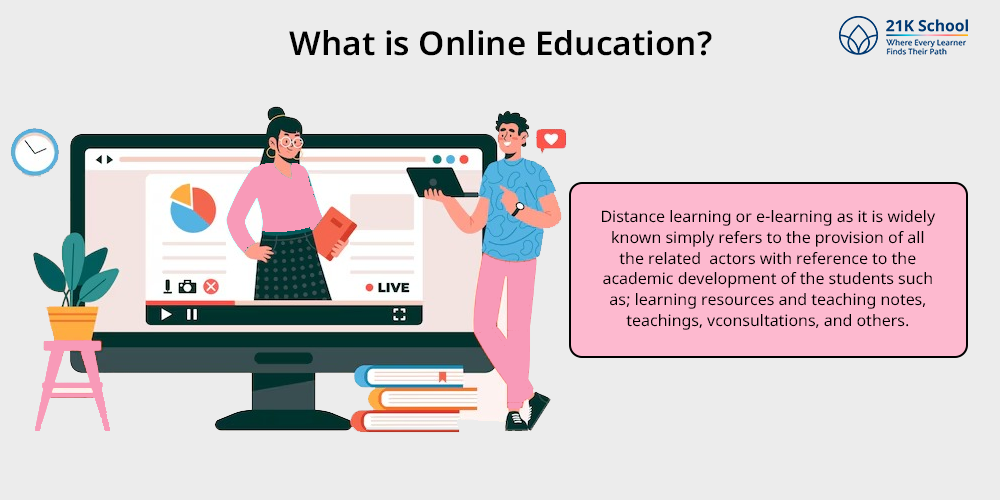
Distance learning or e-learning as it is widely known simply refers to the provision of all the related factors with reference to the academic development of the students such as; learning resources and teaching notes, teachings, consultations, and others.
Besides this, online homeschooling platforms like 21K School have increased the authenticity and reliability among parents and students as it is not confined to only academic progress but child progress as a whole.
In this mode, they can use their online materials, attend classes, submit assignments online, learn, and accomplish their targets at their own pace.
Of all the advantages of online education, flexibility, which has never made learning easy, individualised, and personal is some of the most valuable.
They help a learner in managing his or her class work alongside other activities that one has to attend to such as family or other issues to do with personality.
The student gets a chance to access a great number of classes, information, and programs which gives an open option for the student to state his/her interest and goal no matter where the student is localised and what kind of disability he/she has.
Key Factors Driving the Rise of Online Education
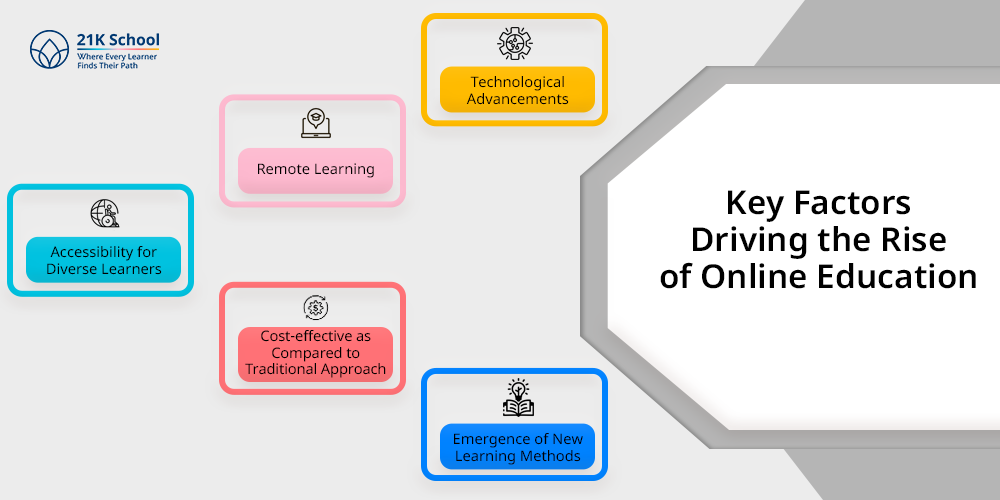
With time online education is expanding their branches not only in India but also in the world. Many students feel comfortable in online learning.
There are many reasons for the growing demand of online education from pandemic to recorded videos, students can now prioritize their other hobbies.
Let’s understand some of the key factors driving the rise of online education:
1. Technological Advancements
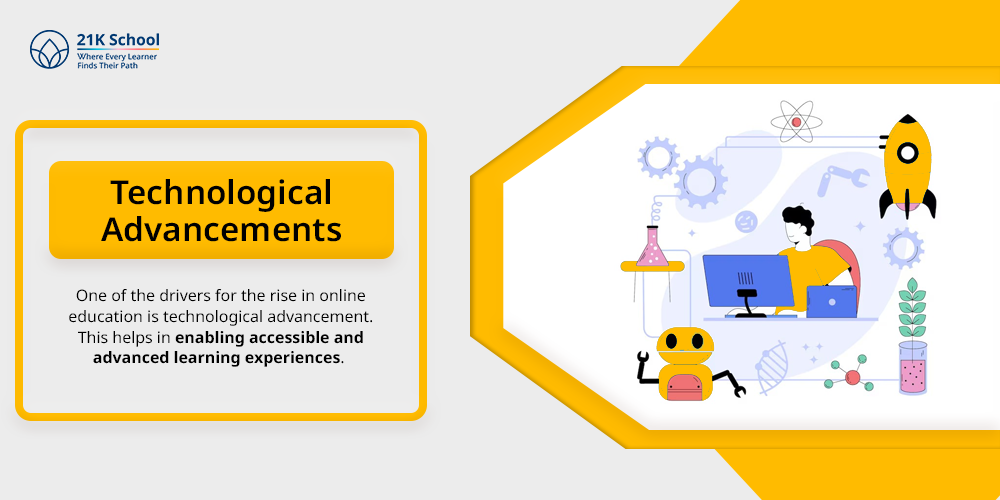
One of the drivers for the rise in online education is technological advancement. This helps in enabling accessible and advanced learning experiences.
By improved infrastructure, diverse course offerings, and enhanced interactive tools online platforms like 21K school provide a comfortable environment.
To know more on technology advancement read how technology can support students
2. Remote Learning
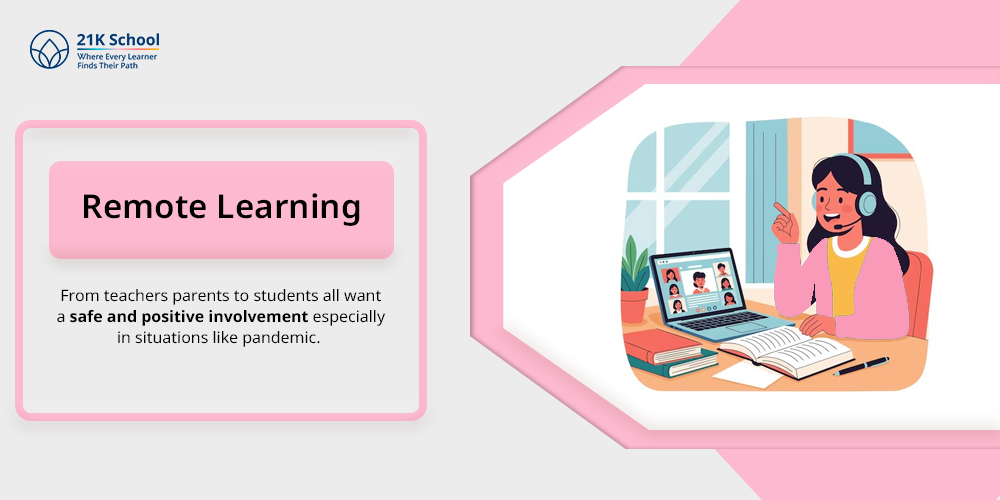
Remote or online learning has become a necessity for everyone. From teachers parents to students all want a safe and positive involvement especially in situations like pandemic.
Several key factors such as technological advancements, increased flexibility and accessibility, cost-effectiveness, and changing workforces direct towards remote learning.
Now students can use different tools like video meeting, digital whiteboards, and learning management systems to learn the concepts easily.
3. Accessibility for Diverse Learners
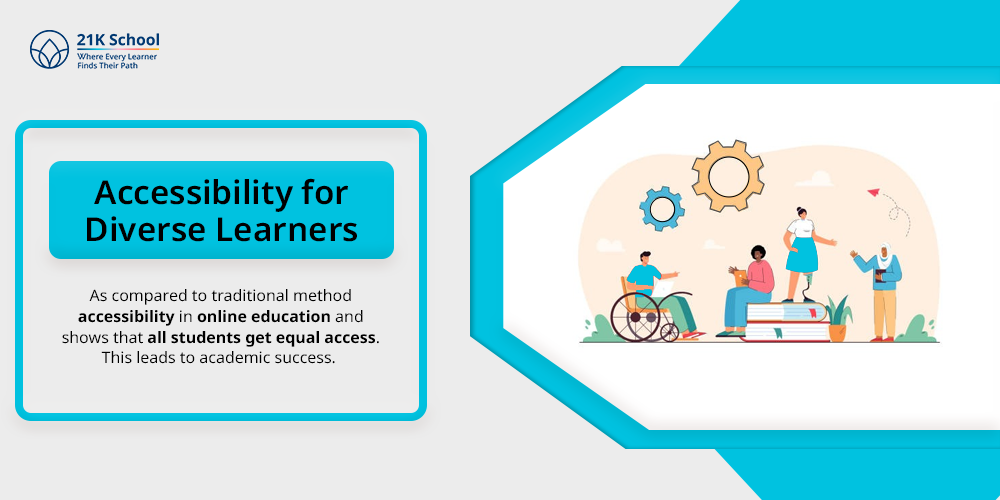
As compared to traditional method accessibility in online education and shows that all students get equal access. This leads to academic success.
As we know each student is different and the same as everyone’s educational needs. Students with disabilities need a special and customised curriculum.
To fulfill all requirements of general and special students online learning provides accessibility for diverse learners.
4. Cost-effective as Compared to Traditional Approach
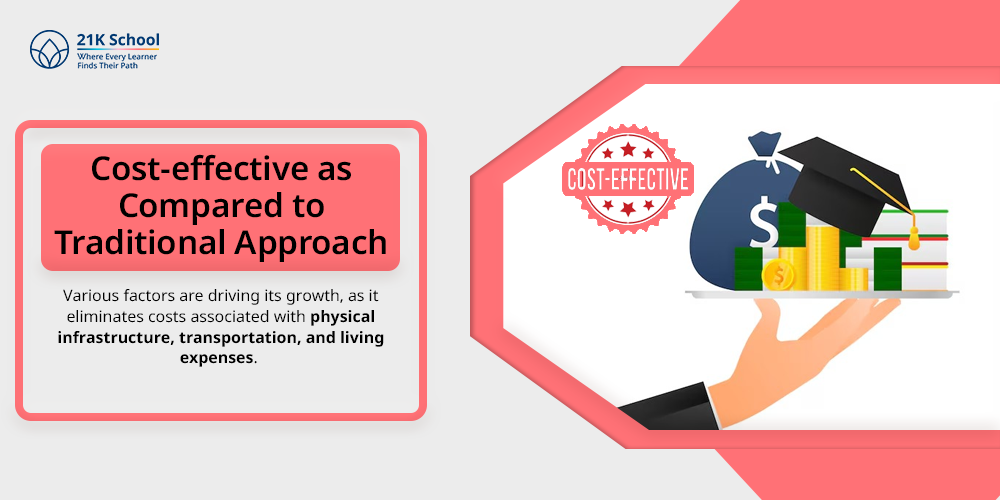
Online education is not only good for comfortability and flexibility but also provides a cost effective approach as compared to traditional education.
Various factors are driving its growth, as it eliminates costs associated with physical infrastructure, transportation, and living expenses.
For example schools like 21K school design their online learning courses based on student needs to cater broader spectrum learners including International students.
Are you planning to opt virtual learning then read the technology benefits for k12 online education.
5. Emergence of New Learning Methods
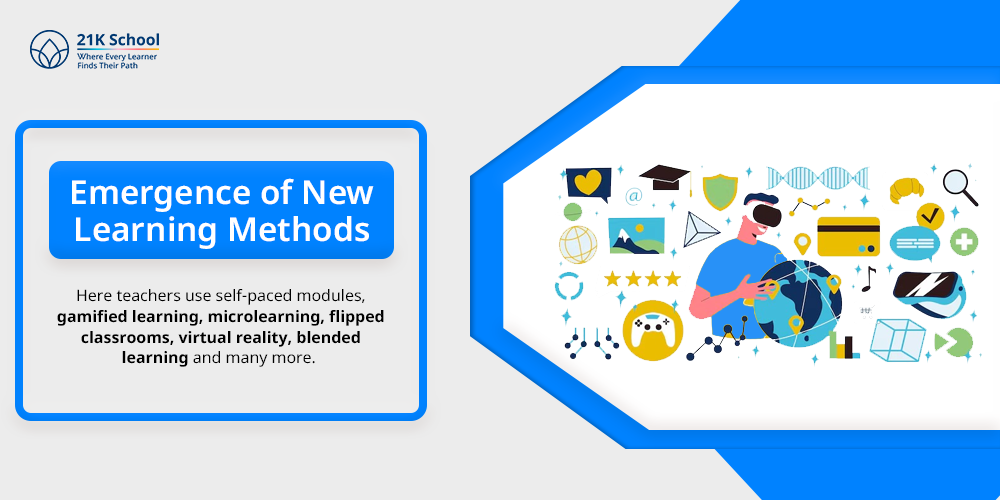
Introduction of new learning methods in online education is a rising factor of learning.
Here teachers use self-paced modules, gamified learning, microlearning, flipped classrooms, virtual reality, blended learning and many more.
These methods help students to learn in a better way without any exam stress. It provides various learning styles and gains learners to memorize that suits best.
Advantages of Online Education
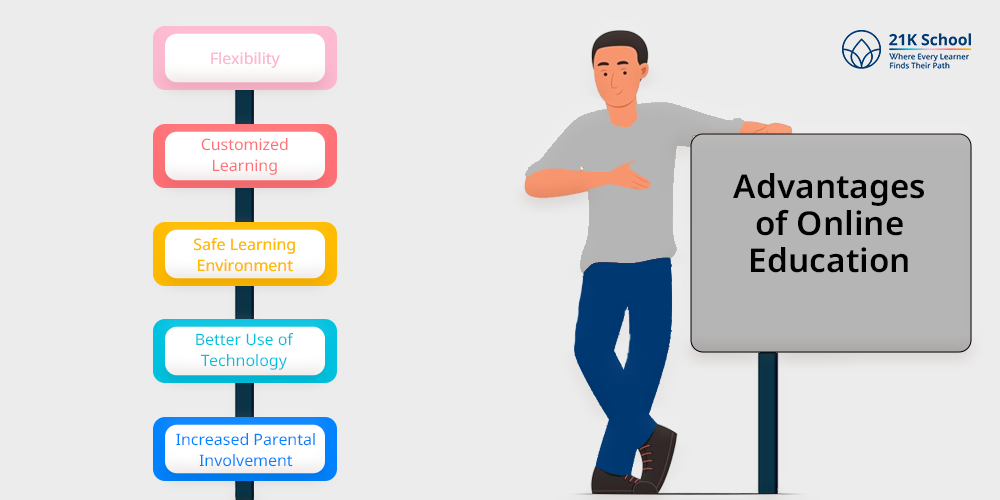
The key advantages of online education are flexibility, customized learning, safe learning environment, and others like:
1. Flexibility
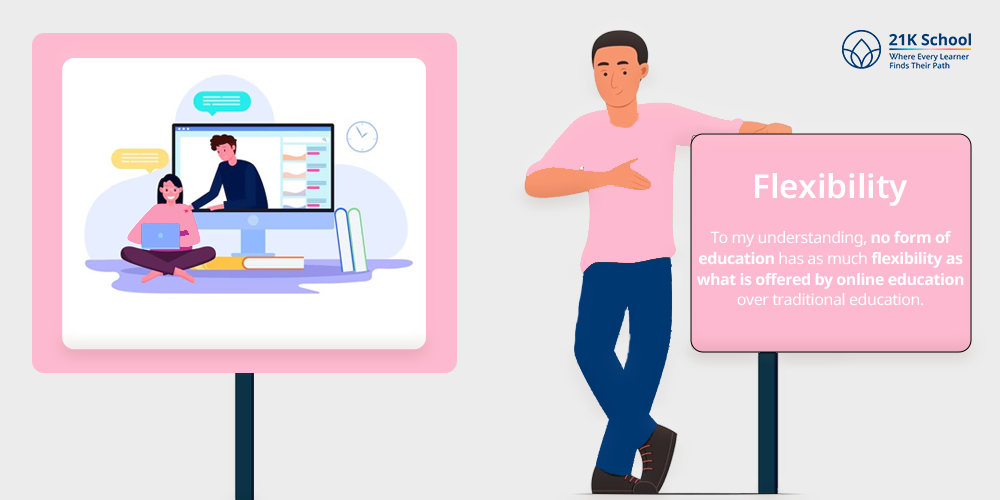
To my understanding, no form of education has as much flexibility as what is offered by online education over traditional education.
This gives the students the way to come up with the kind of schedule they feel will help them and according to the responsibilities they will be required to attend to.
In other words, if there is a student who enjoys, or whenever he or she is more concentrated during the evening time this is the time he or she can study.
However, if there was some form of extracurricular activity to attend or any sort of family business, the student can easily manage his or her school work by this.
This freedom enables the students to work in their own time and in their own way, which is most convenient for them.
2. Customized Learning
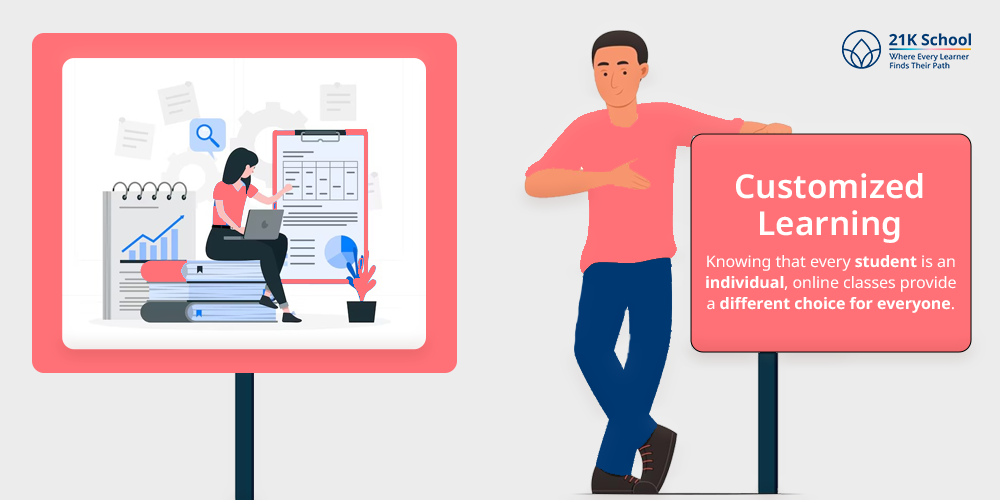
Indeed, one of the most valuable and greatest strengths that all online schooling has to offer is that students can choose the course offerings.
Knowing that every student is an individual, online classes provide a different choice for everyone.
For instance, if a given student is clever in a given topic, they can complete it fast, on the other hand, if they are not so good in some topics they can spend most of their time studying the topics without feeling that they are left behind in the pace of others. Here, anyone’s child’s development counts.
3. Safe Learning Environment
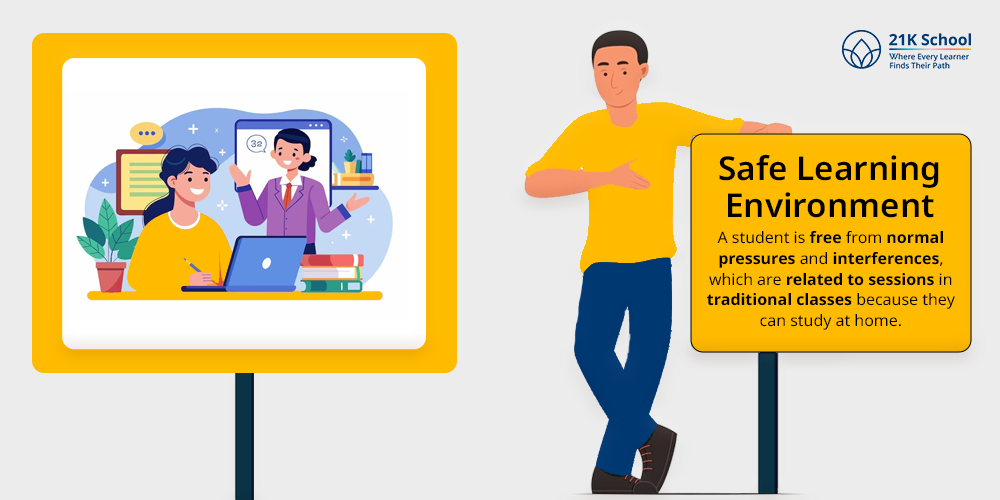
Internet homeschooling is therefore one of the safest and most secure means of learning.
A student is free from normal pressures and interferences, which are related to sessions in traditional classes because they can study at home.
This can be quite useful for learners who perhaps endure a lot of pressure when learning in mainstream schools.
Students are also able to focus better on their class work and are also relaxed when responding to questions hence producing quality students.
4. Better Use of Technology
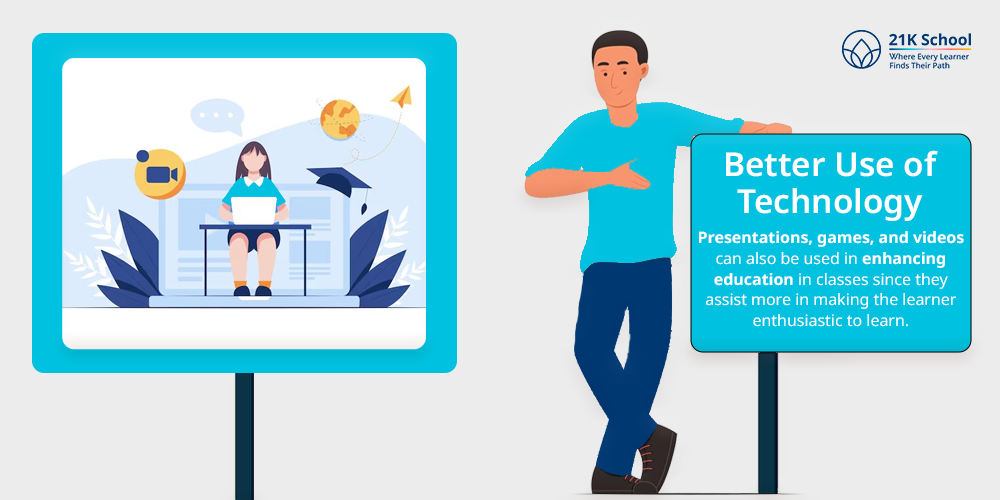
Teaching practices used in online homeschooling include the current technology which can help uplift the teaching process.
Presentations, games, and videos can also be used in enhancing education in classes since they assist more in making the learner enthusiastic to learn.
As for information, the learners can come across numerous sources that can meet different learning types; such are the types of learners as the visual, auditory, and kinesthetic types of learners.
The use of technology is also beneficial in preparing the learners for the future, this is because society is bound to increase the use of technology.
5. Increased Parental Involvement
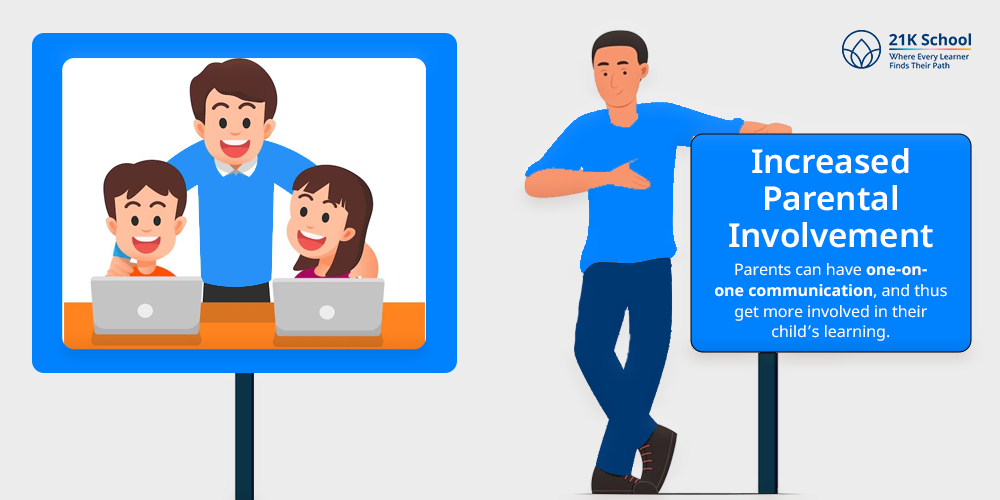
Since the internet can easily be accessed homeschooling online offers a better way of engaging parents in the education of their children.
Parents can have one-on-one communication, and thus get more involved in their child’s learning. This can enable them to keep a close watch on them and shape and mold them as and when necessary.
This engagement can go a long way in building a good parent-child relationship and can be useful in ensuring the children get more support in their learning activities.
Some advantages of online homeschooling include; flexibility of learning sessions, which is always in accordance with the parent’s and or student’s timetable, safety/ security/ discipline, the use of technology in learning, and parental control over students.
According to these benefits, students in many families receive education online, which becomes successful for students’ academic and personal growth.
Challenges of Online Education
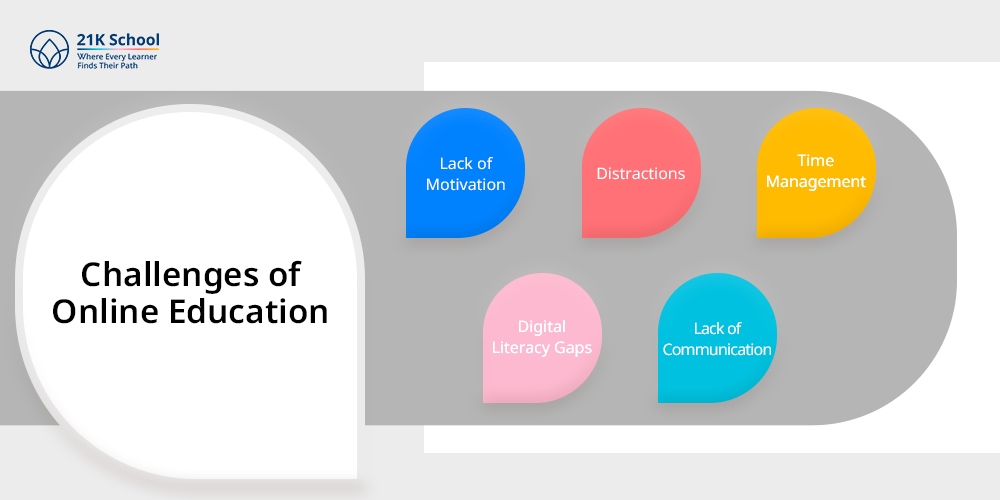
Understanding the challenge of online education is also important to find the solution. Here’s a more detailed look at some of the key challenges:
1. Lack of Motivation
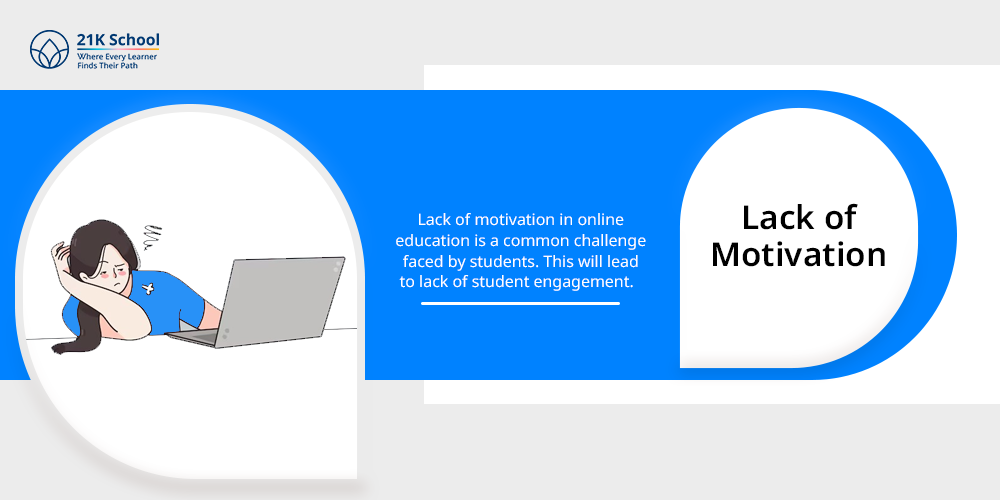
Lack of motivation in online education is a common challenge faced by students. This will lead to lack of student engagement.
Various factors such as absence of in-person interaction, difficulty maintaining focus in a home environment, and the overall stress associated with remote learning.
Without the structure and social environment of a physical classroom, some find it hard to stay engaged.
2. Distractions
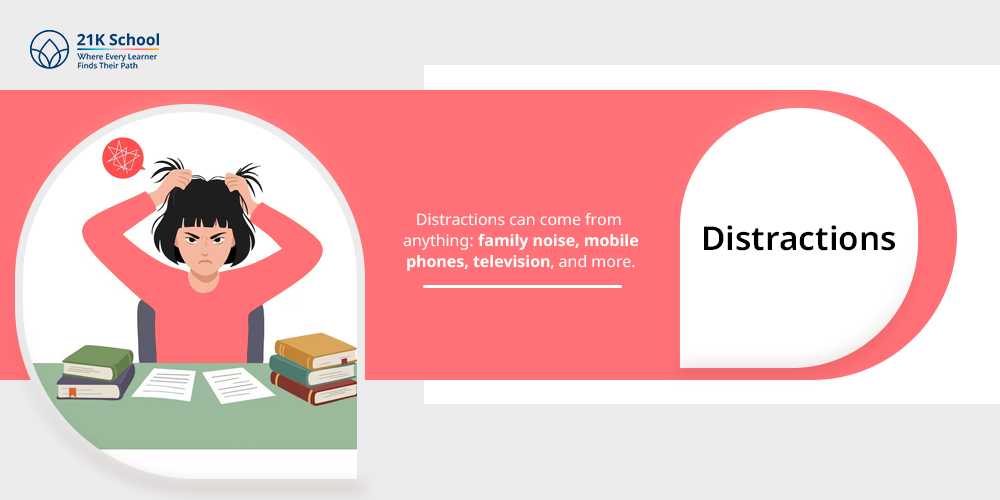
Online learning environment and shows that students learn from their own home on table and favourite place. However sometimes this can be a distraction for students.
This can hinder students’ ability to concentrate and engage effectively with their coursework which can impact their focus and academic performance.
Distractions can come from anything: family noise, mobile phones, television, and more.
3. Time Management

Issues in time management is another challenge of online education. It happens due to the lack of a structured schedule and the increased need for self-discipline and motivation.
Understand the importance of time management for students for academic achievement.
Students need to be more attentive especially when there is important meeting homework or information sharing in devices. In online education people easily miss their deadlines when they do not plan the whole day.
Here you can read how to improve time management skills ?
4. Digital Literacy Gaps
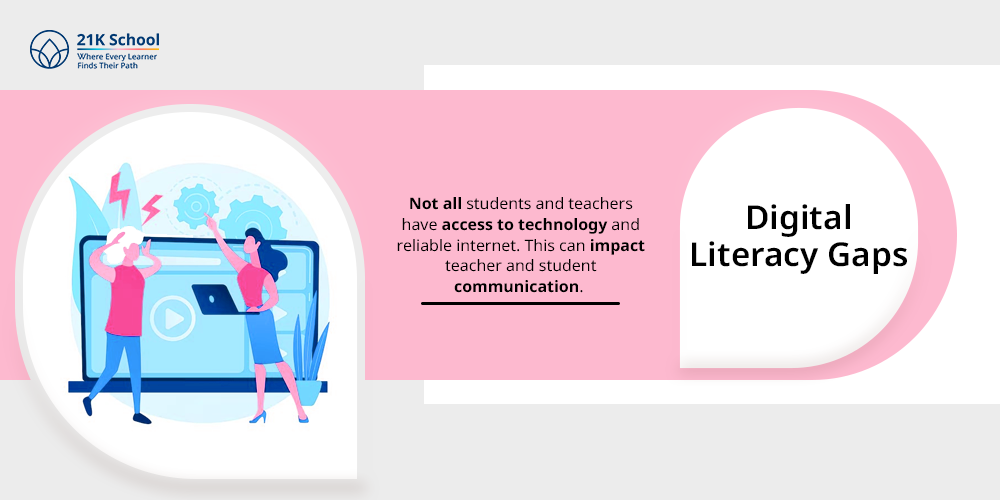
Online education needs digital skills. However, not all students and teachers have access to technology and reliable internet. This can impact teacher and student communication.
Everyone needed technical skills to navigate digital platforms, and the ability to critically evaluate online resources. This can be a major rural education problem.
5. Lack of Communication
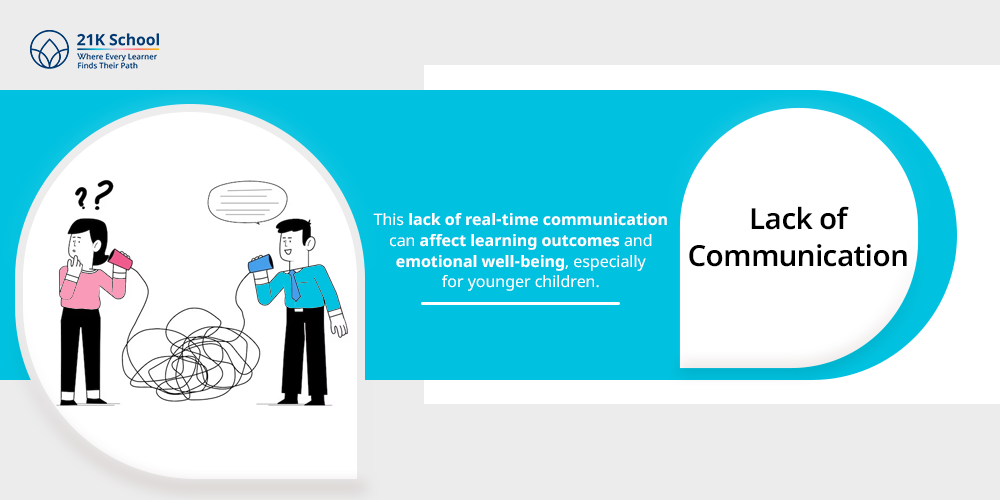
Communication skills are a key to success and achievement. Lack of communication sometimes feels isolated and confused especially when students are stuck in some maths or science problem.
This lack of real-time communication can affect learning outcomes and emotional well-being, especially for younger children.
Growth of Online Learning: A Data-Centric Overview
Global Growth of Online Learning
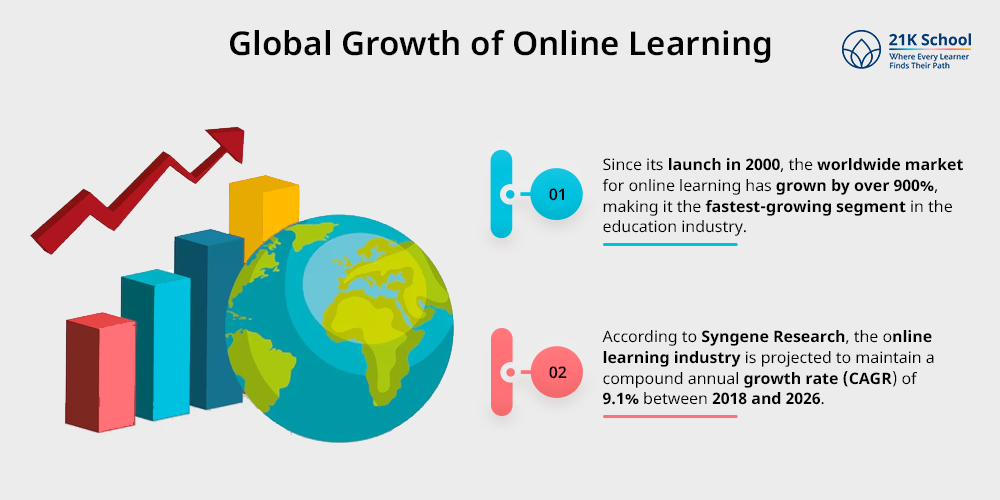
Since its launch in 2000, the worldwide market for online learning has grown by over 900%, making it the fastest-growing segment in the education industry.
This exponential growth can be attributed to the wide range of courses available, catering to everyone from degree-seekers to hobbyists.
According to Syngene Research, the online learning industry is projected to maintain a compound annual growth rate (CAGR) of 9.1% between 2018 and 2026.
Online Learning in the United States
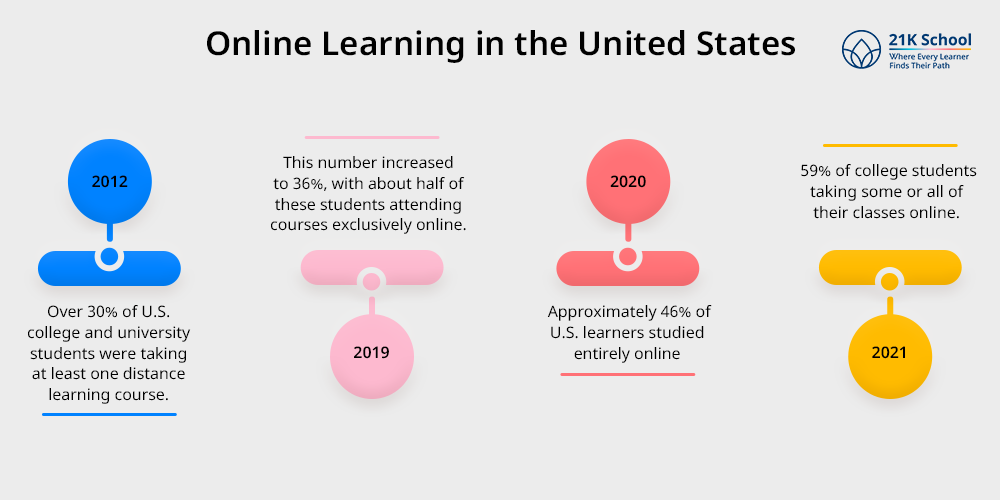
The evolution of online learning in the U.S. has been notable, particularly over the past decade:
- 2012: The foundation of major MOOC providers such as edX and Coursera marked a significant year. According to the National Center for Education Statistics (NCES), over 30% of U.S. college and university students were taking at least one distance learning course.
- 2019: This number increased to 36%, with about half of these students attending courses exclusively online.
- 2020: The COVID-19 pandemic drastically shifted education to remote learning. Approximately 46% of U.S. learners studied entirely online, while another 28% took some courses remotely.
- 2021: The trend continued with 59% of college students taking some or all of their classes online.
Online Learning in India
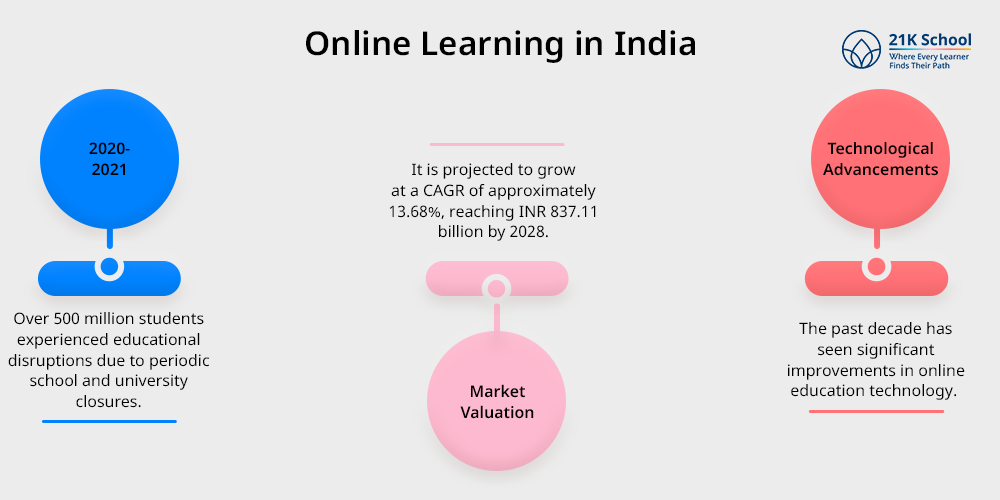
India has witnessed significant growth in online education, driven by technological advancements and the disruptions caused by the COVID-19 pandemic:
- 2020-2021: Over 500 million students experienced educational disruptions due to periodic school and university closures. This led to a surge in the use of online learning platforms across various educational levels, including primary, secondary, higher education, test preparation, and informal learning.
- Technological Advancements: The past decade has seen significant improvements in online education technology. These include the integration of information and communications technology (ICT) in classrooms and the adoption of cloud-based platforms, virtual reality (VR), and augmented reality (AR).
Future of Online Education
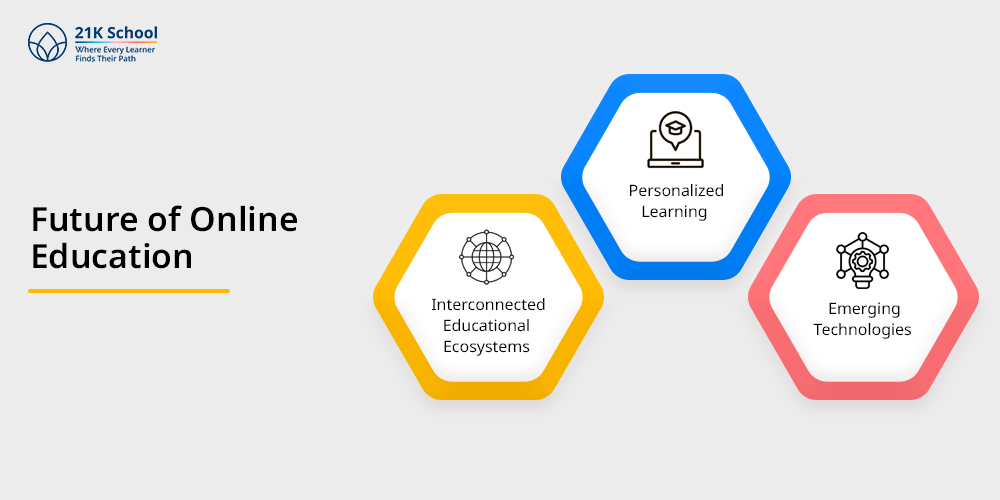
As Technology involved with time, the future of online education becomes more advantageous. Students, parents and educators are now experienced in virtual tools and handle them with precision.
The future of online education includes interconnected educational ecosystems, personalized learning, and the integration of emerging technologies like AI, VR, and AR.
Here are some more detail look of future online learning:
1. Interconnected Educational Ecosystems
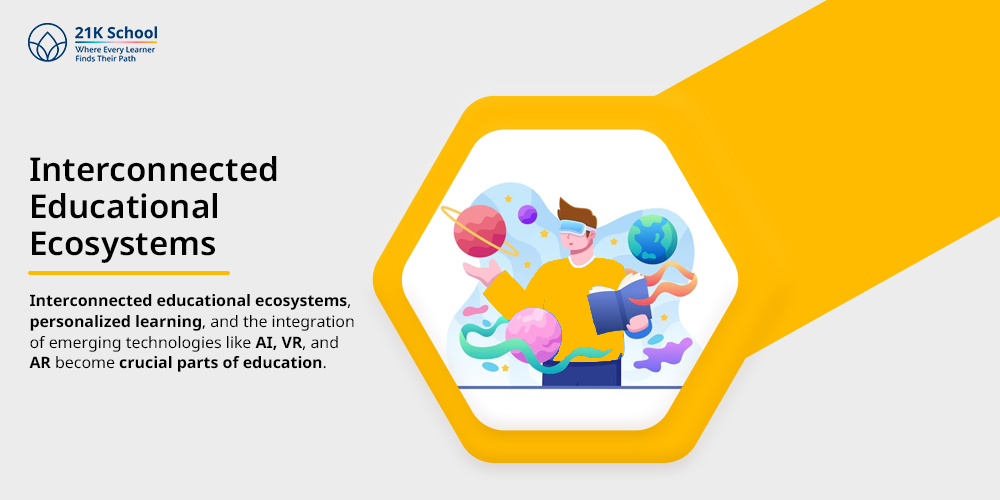
So with time integration of online and offline education becomes seamless. Interconnected educational ecosystems, personalized learning, and the integration of emerging technologies like AI, VR, and AR become crucial parts of education.
These changes lead to more accessible, flexible, and engaging learning experiences. Now the pathway of learning becomes easy and without any hurdles.
2. Personalized Learning
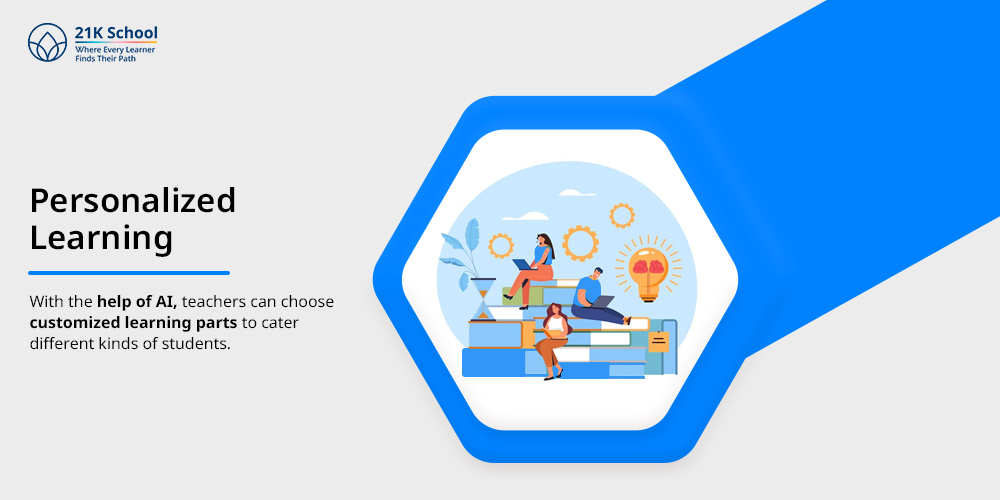
In online education personalized learning enables adaptive and individualized learning experiences. With the help of AI teachers can choose customized learning parts to cater different kinds of students.
By understanding their strengths, weaknesses, and learning styles teachers can fill the gaps and allow students to progress towards success.
3. Emerging Technologies
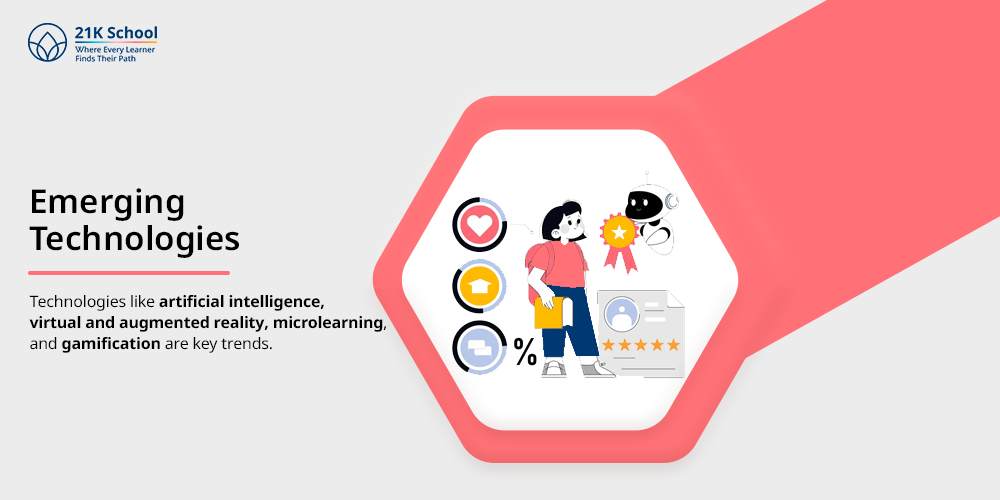
Emerging new technologies scope of online education better learning environment. Technologies like artificial intelligence, virtual and augmented reality, microlearning, and gamification are key trends.
These trends will help in shaping the future of online education in a wider spectrum according to specific learning styles. Hence, technology helps in offering customized learning to modern learners.
Also read the 5 benefits of personalized learning.
The rise of online education helps both urban and rural students shift into a better learning environment. It will increase innovation and accessibility to learn effectively.
It is time to make tomorrow’s classroom an effective opportunity for students and teachers.
Conclusion
In conclusion, online education, exemplified by platforms like 21K School, is revolutionizing the way we approach learning.
With its flexibility, customized learning experiences, safe environment, effective use of technology, and increased parental involvement, it offers significant advantages over traditional education.
As technological advancements continue to enhance e-learning, online education is poised to become an integral part of the educational landscape, providing students with the tools and opportunities to thrive academically and personally.
